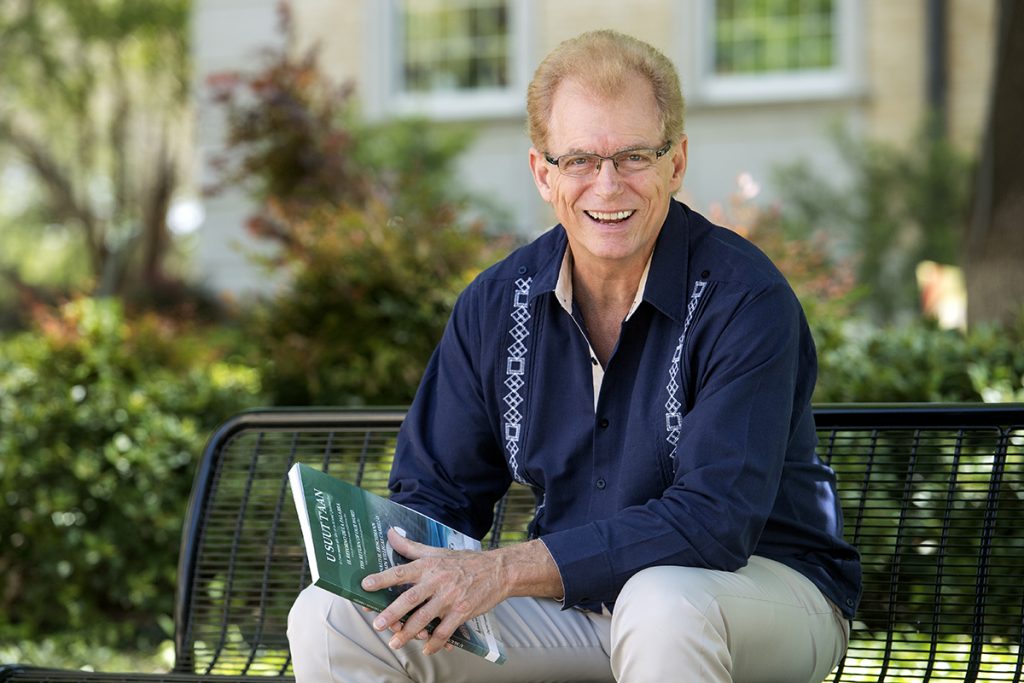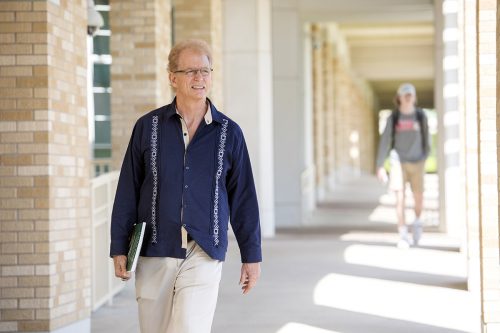Mayan Poets, Storytellers Share their Ancient Language
A new book, translated by a TCU professor, highlights contemporary Mayan poets and storytellers.
Mayan Poets, Storytellers Share their Ancient Language
A new book, translated by a TCU professor, highlights contemporary Mayan poets and storytellers.
Mayan people inhabited the Yucatán Peninsula several thousand years before 16th-century Spanish conquistadores arrived to lay waste.
The Mayans, and their language, “didn’t vanish, as many people think,” said Donald Frischmann, professor of Spanish and Hispanic Studies whose sixth multilingual anthology of modern indigenous Mexican writing was recently published.
The Return of Our Word (Secretaría de Educación y Cultura del Estado de Quintana Roo, 2016) highlights contemporary Mayan poets and storytellers from the Yucatán state of Quintana Roo.
Translating the works into Spanish and English might attract the larger audiences the authors deserve, Frischmann said. As is, “They are somewhat invisible beyond certain boundaries.”

Donald Frischmann translated much of the The Return of Our Word during a Fulbright-sponsored stay in Mexico in 2013. Photo by Jeff McWhorter
Modern Mayans, concentrated in southeastern Mexico and in Belize, speak a language passed down mainly through speech, as Spanish invaders burned most indigenous texts. Frischmann said today, about 2 million people in the region are active speakers of Yucatec Mayan.
But globalization has extended to Quintana Roo’s small villages, bringing someone else’s televised culture, engineered corn and the whisper of a better future elsewhere.
Mexican people desiring 21st-century job opportunities want to master Spanish and, perhaps, English. But Mayan? For many, it’s a relic.
To prevent the Mayan words from evaporating, some locals are breathing new life into the language, Frischmann said. “Enough talented individuals and clear-thinking individuals decided to take things into their own hands and do everything possible to perpetuate, to keep Mayan culture alive.”
One pen-wielding linguist is Wildernain Villegas Carrillo, a professor of languages and interculturality at the Universidad Intercultural Maya de Quintana Roo and Frischmann’s editorial partner in The Return of Our Word.
Fresh Mayan works have a twofold purpose, Villegas said. Writing in one’s native tongue “allows a more profound, intimate encounter with his surroundings, nature, with his culture, with his identity,” he said in Spanish. (Frischmann translated into English.) “It’s important to demonstrate to the world that [Yucatec Mayan] is an important language. It’s not a lost language. It’s a living modern language.”
Villegas’ poetic flavor was on display in September when he read several of his works in Mayan and Spanish to a group of about 60 at TCU. Frischmann followed with the English versions. Compared with the other languages, the vowel-dominated Yucatec Mayan was notably softer, airier. Side-by-side, Spanish sounded like a lamentation.

Donald Frischmann said translating the works into Spanish and English might attract the larger audiences the authors deserve. Photo by Jeff McWhorter
Frischmann explained to the group how the duo’s anthology came together through fieldwork. He and Villegas, with “as much water as we could carry,” ventured through Quintana Roo’s nooks and crannies, asking locals in hard-to-find villages for directions to even-harder-to-find villages where rumored Mayan writers lived.
The book’s contributors ranged from language professors to rural farmers. Much of the adventuring and translating happened during Frischmann’s 2013 Fulbright-sponsored stay in Villegas’ home city of José Maria Morelos.
Villegas translated from Mayan to Spanish. Frischmann used both versions to derive the English. The process was difficult. For example, the TCU professor explained how he translated a poem about the ja’abin tree.
The author, Gregorio Vázquez Canché, included a reference to the flower’s “sound.” Sensible to a local, Frischmann said, but “to an English reader … what sound does the flower make?”
It’s important to demonstrate to the world that [Yucatec Mayan] is an important language. It’s not a lost language. It’s a living modern language.
Donald Frischmann
To find the correct word, Frischmann walked outside of his temporary office in Mexico to the surrounding ja’abin trees. He grabbed a flower and shook it until deciding the word “sizzle” would suffice.
Frischmann said translating the 70 poems and stories took almost six years. The work merited careful attention, as some authors were sharing their still-relevant ancestral cosmology.
“One of the most valuable lessons that we can glean from contemporary Mayan literature is an attitude of viewing the world as a living being,” he said. “It has energy. It has vibration. So everything, absolutely everything, is alive and needs to be duly respected.”
Eternal Fire
By Wildernain Villegas Carrillo
(translated into English by Donald Frischmann)
This room observes me:
I walk in blindness,
I talk alone
chasing metaphors of you,
In the corner swings your absence,
I affirm that you await me there,
I approach,
I retreat.
Again, I have forgotten that you are not here.
How could you have died
without awaiting the lightning bolt
you would ignite with each sunset?
Do you remember, Grandfather?
Are you here, or are you not?
Somewhere I have lost your shadow.
The hammock bears your scent,
the earthen floor of this house
holds the dust of your footsteps.
Your casket was a lie
within the grave’s jaws.
May worms eat the words
along with the silence,
the light, the night,
and the church bells.
Yes, Grandfather, yes,
I am listening to you.
Your tools?
Uncle took your divining stone;
brother sold your shotgun;
your carpentry tools were lost
among the sawdust of everyday life.
Of course, Grandfather, I still have it,
alright, as you wish:
I shall bring your quail call
to your grave.
You are here and you are not.
You are, but the afternoon fades without your
eyes,
you are not, but you retell your memory with the
wind.
Courtesy of Wildernain Villegas Carillo and Donald Frischmann. Taken from The Return of Our Word (Secretaría de Educación y Cultura del Estado de Quintana Roo, 2016).

Your comments are welcome
Comments
Related reading:
Campus News: Alma Matters, Research + Discovery
Bilingual Speech Therapy for Stroke Survivors
A monthly bilingual support group at Miller Speech & Hearing Clinic offers hope for people working to regain the ability to speak.
Research + Discovery
Class Travels to U.S.-Mexico Border Wall
Justice Journey illuminates Chicano culture in Texas in conjunction with the Latino/a Civil Rights Struggles course.
Web Extras
A Way with Words
Language isn’t a barrier — it’s a key that unlocks opportunity.